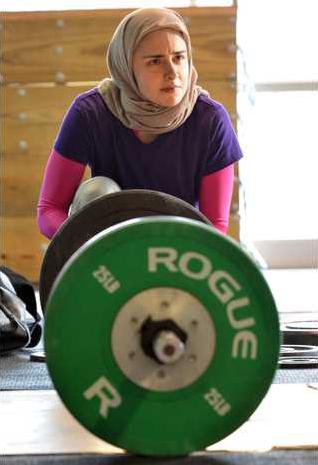ATLANTA — Kulsoom Abdullah's Ph.D. from Georgia Tech and black belt in taekwondo are proof she doesn't back away from challenges.
On Friday, she will become the first woman to compete in the national weightlifting championships while wearing clothing that covers her legs, arms and head, in keeping with her Muslim faith.
The 35-year-old entered the nationals in Council Bluffs, Iowa after the International Weightlifting Federation ruled on her behalf two weeks ago that athletes could wear a full-body "unitard" under the customary weightlifting uniform.
The ruling placed a spotlight on Abdullah, who lives in Atlanta, for her first national competition.
"It will be like an ice-breaker type of experience and hopefully getting over nerves and things like that because I've never been to a competition at this level," Abdullah told The Associated Press.
She said she already considers her participation a victory, simply because she now has the right to lift while covered.
"I think that was the biggest thing for me," she said. "So even if I don't do my best or my personal records, I think that was the big thing for me. The accomplishment was to get started competing."
Before last month's ruling, IWF rules stated that an athlete's knees and elbows must be visible so officials can determine if a lift is correctly executed.
The unitard, worn under the customary weightlifting uniform, will provide Abdullah the covering her faith requires while allowing judges to see if she properly locks her elbows and knees.
IWF vice president Sam Coffa of Australia, who leads the organization's technical committee, noted in the ruling that weightlifters always have been allowed to wear head coverings such as the hijab.
Abdullah, who trains under coaches Travis Cooper and Jake Rubash, rushed to find a suitable unitard while also scrambling to accelerate her workout schedule.
Abdullah, who weighs about 100 pounds, will compete in the 48 kilogram (105.82 pounds) weight class. Rubash said she can dead lift about 250 pounds.
"That's very impressive for a woman her size," Rubash said.
But mom won't be watching.
"The biggest thing for her is it scares her," Abdullah said with a laugh. "She's afraid I'll get hurt. Even if I show her video after I've lifted, it still scares her. I think she's more used to it, but it's just hard for her to watch."
Abdullah said she's still attempting to grasp what the ruling could mean for other Muslim women in weightlifting and possibly other sports.
"The fact that it got considered, I think that was big, that I even had a chance to have a presentation be heard. I thought that was great, no matter what the decision."
The petite and soft-spoken Abdullah might seem an unlikely candidate to break down barriers in a sport known for bravado and bulk.
Her younger brother, Nayab, said he has learned Abdullah never stops until she realizes her goals.
"The thing about her, once she starts something and puts it in her mind, she has to finish it," said 24-year-old Nayab Abdullah. "She has to perfect it.
"When she started weightlifting and changed her diet, I thought 'Oh boy, she's going all the way.'"
Nayab said his sister also proved her determination to succeed when she earned her Ph.D. in electrical computer engineering and her black belt in taekwondo.
Born in Kansas, Abdullah was raised in Okeechobee, Fla. She said there were few opportunities in the small town, aside from volleyball and P.E. classes at school.
Her mother, Ghazala, said Kulsoom always was small but athletic.
"When she was like 4 years old she was standing on her head and doing things like that," said Ghazala Abdullah, who along with her late husband came to the United States from Pakistan. "She was interested in sports since she was small."
Said Kulsoom: "I wasn't really into the dolls, I guess. We used to like throw them in the air and let them land, and my mom stopped buying them for me. I used to be into climbing the trees. My mom stopped having me wear dresses because I would skin my knees and tear the dresses. So I would wear jeans and pants."
Now Abdullah's athletic pursuits are making international headlines.
Cooper said he worries that some in the sport could voice their displeasure with the rule change at the competition.
"There's a lot of stress that goes along with that," Cooper said. "Some people don't necessarily agree with the rules change. I would hope everyone is supportive."
Nayab is proud his sister "could go down in history as a woman in sports who inspired other women to do things.
"I can remember when I was 10 years old and she was like 20 that I said 'I bet you can't beat me in arm wrestling,'" Nayab said. "Now it might be a challenge."
Abdullah breaking down barriers
Muslim woman to compete in 1st weightlifting championship





